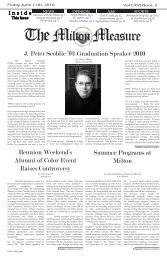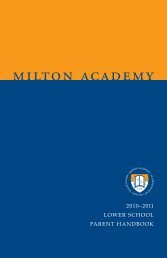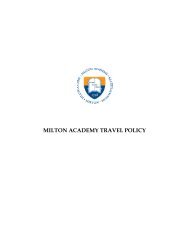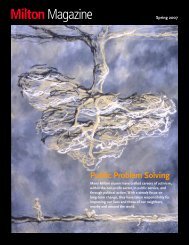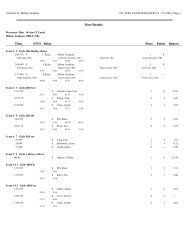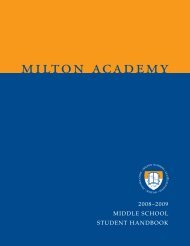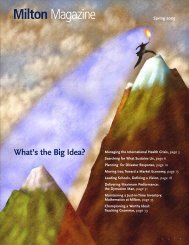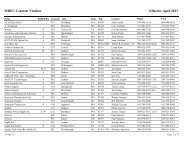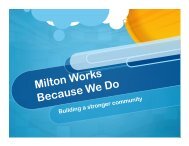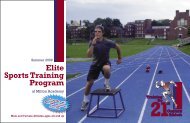Create successful ePaper yourself
Turn your PDF publications into a flip-book with our unique Google optimized e-Paper software.
What are your professional priorities?A) To remain employed. (Hopefully anotherdot-com crash isn’t in the works.)B) I’d like to think that in five years,instead of managing a team of three orfour people, I’ll oversee a Web team of20 or 30. At whatever Web site in thefuture, I want to present the news withas much thought and care as possible.Who is your audience and what do youknow about them? Are they the same folkswho watch the station, for instance?How do they use the site?The majority of people visiting our Website are from the area, and they are concernedabout breaking news and localissues. We try to accentuate the uniquelocal angles of our site for that reason.Because it’s a very competitive market fornews, we know that we have to be just asaggressive in publishing our news onlineas we do on-air.We drive people watching our TV news toour Web site frequently, but at my site(and for other media outlets this is alsotrue) a large number of people who neverwatch our TV station rely on the Web site.The majority of our traffic comes from theworking public. It’s just so easy for someoneto take a quick break from what theyare working on at their desk in the officeto check our headlines and see what theweather forecast is.We’re also seeing growth in our onlinevideo, which is increasingly becoming asource for ad revenue and is a feature thatgives us a big advantage over newspaperWeb sites. Despite all the text out there onthe Internet, there are still a large numberof people who want the news to be told tothem. Online video is perfect for thesetypes of news consumers.What are the important characteristics ofyour medium (Internet) that redefine oldnotions of journalism?A person pursuing a position as an onlinenews editor might want to prepare himselfin some non-traditional ways. A ComputerScience 101 course might come in handy.So might some basic advertising classes.And then there’s also graphic design. I’vefound that it’s necessary to be a jack-of-alltradesin my position. The core tenets ofjournalism are still in play on sites likemine, though, and good writing skills andsound ethical judgment should be the centerpieceof any news Web site that strivesto be a leader in the field.The Web is exciting, and possibly overwhelmingat times, because of the limitlessopportunities to enhance and expandany simple news story. We aren’t limitedto a number of inches, and there are notime limits for a video report. I’m fullyaware that I could spend all day on onestory—adding online polls, posting theunedited original interviews, adding linksand resources as well as other multimediaelements. For the most part, though, Webteams are pretty small and we have to bewise when choosing which stories toexpand.The way in which people get their newsonline is also a point of study. Many timespeople are looking for the latest updatesand only want to skim through a few storiesthat matter to them. For this audience,a long newspaper-type story doesn’twork. I’ve found that concise, tight writingand headlines that draw you in to the storyare very helpful in building an onlineaudience. Posting breaking news items isalso an invaluable practice.What are your predictions about the directionof broadcast stations and their relatedWeb sites?Broadcast stations are admittedly behindthe curve when it comes to devotingresources to their Web sites. Newspapers,which have already faced declining ad revenues,generally have created larger Webstaffs. They sell more ads online and theytend to dominate markets for online news.Jesse Sarles ’93Many TV stations’ Web sites are now playingcatch-up. At this time, declining on-airrevenue is starting to affect TV stations,and as they seek out new ways to makemoney, I think they will increasingly turnto the Web.Having meteorologists and expanded onairreporters who know their turf are clearcompetitive advantages for TV station Websites, and I think doing exclusive onlinenewscasts and live streaming news eventsis going to be more and more common.Radio stations don’t have these assets attheir disposal, so I think they’ll have amuch tougher time keeping up in the digitalworld and making money from theirWeb sites.People will likely be watching our newsand getting the weather in their cars,iPods or wireless devices in the nearfuture. So much is still set to change withthe way people consume news. We’ve gotto be ready for it.It’s an exciting time for me. The Internetis really starting to boom. With the rise ofblogging, advertisers pouring money intoonline ad campaigns and rapidly growingbroadband connections, it’s a great time toget into online news.With what kinds of issues is the PoynterInstitute’s program for Internet leadersinvolved? [The Poynter Institute is aresource for journalists.] Has participationthere affected your professional growth?In May of 2004 I attended a lengthy seminarfor online news leaders at Poynter. Itcovered a whole range of topics, from theseparate set of ethics involved in publicationof news online to effective strategiesfor laying out news on a homepage whilestill pleasing advertisers who want substantialvisibility. The seminar leaders alsointroduced us to a study called Eyetracker[www.poynterextra.org/eyetrack2004], a massiveresearch project devoted to analyzinghow study participants viewed and consumednews online. This was a big confidencebooster for me: this and otheronline behavior studies are helping to takea lot of the guesswork out of online newspresentation online. I want to make it assimple as possible for people to get thenews and information they need, and it’sbecoming less of an experiment every day.Cathleen Everett13 <strong>Milton</strong> Magazine




